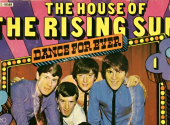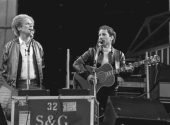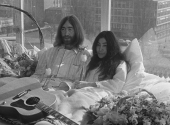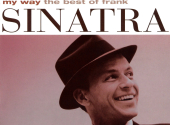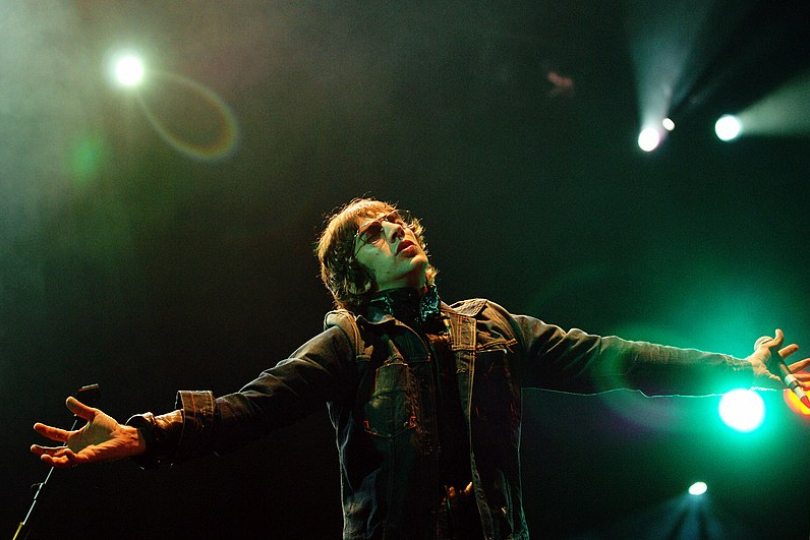
Story of a Hit #9: "Bitter Sweet Symphony"
The Verve's 1997 hit has endured the decades. One of the most recognisable songs from the 90s, with its ethereal strings and nonchalant video clip, Bitter Sweet is a song that almost everyone has heard. It's also the subject of one of the most famous and unfair copyright disputes in recent times.
The 90s was the decade that saw the rise of Britpop, a British-born subgenre of alternative rock. It was bright and catchy, especially in contrast with the grunge movement coming out of the US at the same time. It rose in prominence in the early 90s – partly pushed by the media, fashion and even politicians – culminating in a battle in 1995 between its two biggest proponents, Oasis and Blur.
At the same time as Britpop was gaining momentum, The Verve were on the slow rise to fame. In their early years, they supported The Smashing Pumpkins on their European tour in 1993 and at another time, Oasis actually played as support for them – although they quickly surpassed The Verve in terms of fame. After their first two albums charted, but not particularly well, they finally made it to the top 10 in June 1997 with the song that would go on to define them.
The Verve had a tumultuous journey throughout the 90s, having multiple breakups and various incidents on tour, and the disputes between the band members are well-publicised today. They actually broke up in 1995, following a breakdown between the lead singer Richard Ashcroft and guitarist Nick McCabe, according to Ashcroft.
The album that made them famous
However, minus McCabe, the band reformed and spent 1996 writing and recording material for their third album, Urban Hymns. Apparently, these songs were all penned by Ashcroft – all 4 band members are credited on songs from their first two albums, while on Urban Hymns it's only Ashcroft. This might explain the success of the album and its singles, that Ashcroft himself had come into his own as a songwriter. McCabe, however, said that the songwriting process wasn't that different than on previous albums, with many of the tunes already existing in some form prior to the 1995 breakup. In a 2017 interview with Drowned in Sound while discussing how he rejoined the band, he said if the songs had already "been as amazing as they were when I finished with them I might not have been asked back!"
When they released the single "Bitter Sweet Symphony" it came on the backs of huge British hits like Oasis' "Wonderwall" and "Don’t Look Back In Anger" (1995), "Common People" (1995) by Pulp and "Song 2" (1997) by Blur. It was an epic era of British pop and The Verve's rise to fame was a surprise to many. But while Bitter Sweet peaked at number 2 on the British charts, it was another single from the same album, "The Drugs Don't Work", that made it to number 1 that year.
The album Urban Hymns (1997) was their first major commercial success and consequently, The Verve found themselves in the spotlight. At the 1998 Brit Awards, the band won Best British Act and Best British Album and were featured on the cover of Rolling Stone magazine in March of the same year.
An iconic bittersweet classic
Its most enduring hit is definitely "Bitter Sweet Symphony", which has somehow lived through almost three decades of popularity, with many people today not even knowing the band behind the song. It's a dreamy, string-filled, almost chant-like classic. A bold one-minute-long string introduction kicks straight into an extremely memorable chorus, that flows over a slow walking pace tempo.
Appropriately, the video clip fits perfectly, featuring an aloof Richard Ashcroft slowly striding down a busy London street, bumping into strangers while barely flinching. Like so many hits, the video clip itself became a classic, getting nominated for three MTV awards. It has obvious influences from Massive Attack's "Unfinished Sympathy", but The Verve's clip went on to be parodied by Fat Les in a song written for the 1998 world cup in France.
A 22-year-long legal dispute
Bitter Sweet Symphony was actually based around a four-bar sample of a cover version of "The Last Time" by the legendary Rolling Stones. Supposedly, Ashcroft heard the 1965 cover by the Andrew Oldham Orchestra and thought he could turn it into "something outrageous". They obtained the rights from Decca records to use the 4-bar string sample, however, they were denied permission from the former manager and producer of the Stones, the notoriously ruthless Allen Klein.
There it is in its original form, the string line that lies in the background and encompasses most of "Bitter Sweet Symphony". But apparently, Klein claimed that the band had used more from the song than they had been permitted to in the first place. It was claimed that the melody of Bitter Sweet was an unauthorised reuse of the original melody of "The Last Time", albeit at a slower speed. Listen to the Stones' original song, and try to imagine what the melody sung by Mick Jagger would sound like at half-time.
The similarity is certainly there, and it led to legal action by Klein and ABKCO Records that forced The Verve to relinquish 100% of the royalties and the songwriting credits. That meant that Mick Jagger and Keith Richards were added as songwriters and Ashcroft got nothing from the song's success. This is despite the original sample actually being written by David Whitaker and produced by a completely different former manager, Andrew Oldham.
It was viewed by many at the time as a gross injustice in the music world, with Keith Richards himself saying "if the Verve can write a better song, they can keep the money." It led to the non-existent songwriting trio Jagger/Richards/Ashcroft being nominated for a Grammy in 1999 despite never having worked together. Reportedly Ashcroft only received $1000 and manager John Kennedy described it as "one of the toughest deals in music history."
A happy end?
However, after the death of Allen Klein, his son Jody took over ABKCO. In 2018, Richard Ashcroft said, "someone stole god knows how many million dollars off me in 1997, and they’ve still got it ... I’m telling Allen Klein Jr., I’m coming for my money, man." Ashcroft's manager spoke to the Stone's manager and in 2019, Jagger and Richards agreed to relinquish their credits and future royalties back to the frontman of The Verve.
It was estimated by 2019 that the song had made approx $5 million, but of course, none of that will go to its original songwriter. However, if the song continues to be as popular in the following decades, then Ashcroft stands to finally make something from his biggest hit. A bittersweet ending indeed.
What do you think, is "Bitter Sweet Symphony" one of the biggest hits of the 90s British pop era? Was the copyright dispute fair and should ex-managers and producers be able to change songwriting credits, against the will of the participants?
Leave your opinion in the comments below!
If you have found an error or typo in the article, please let us know by e-mail info@insounder.org.


